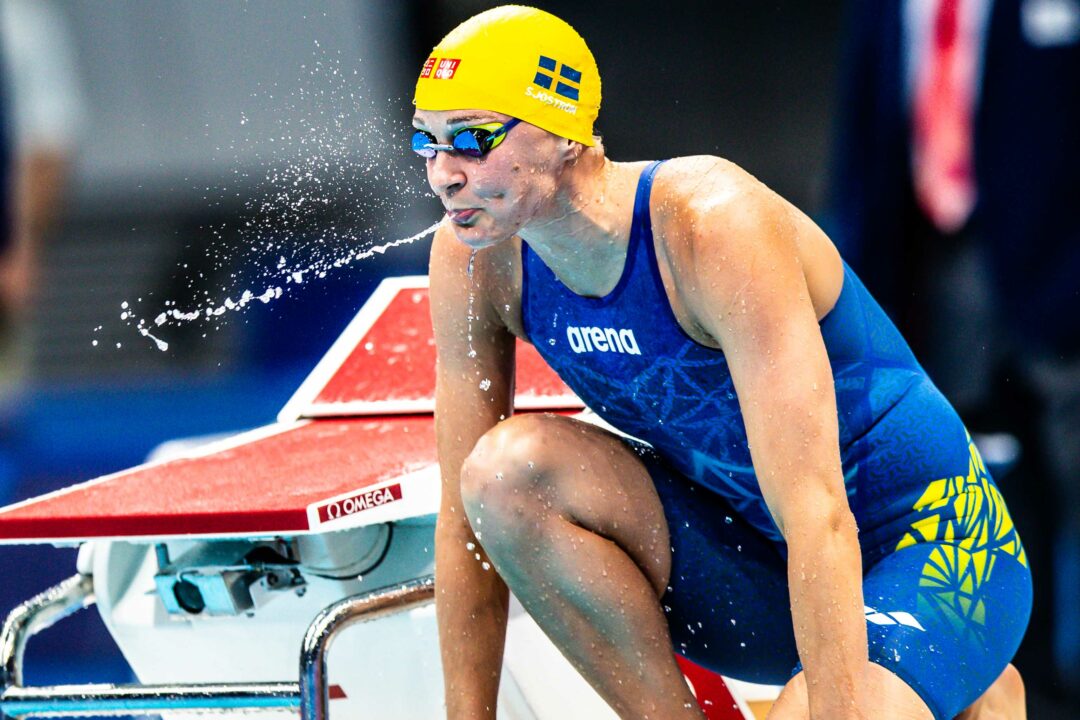SwimSwam welcomes reader submissions about all topics aquatic, and if it’s well-written and well-thought, we might just post it under our “Shouts from the Stands” series. We don’t necessarily endorse the content of the Shouts from the Stands posts, and the opinions remain those of their authors. If you have thoughts to share, please send [email protected].
This “Shouts from the Stands” submission comes from Kyle Barclay, a former collegiate swimmer that now works in the medical field.
College swimming has a special place in American swim fans’ hearts. To those who don’t reside in the U.S., numbers like 17.63 seem odd. (Could that be someone’s mediocre stack cup PB?) But to those of us who get to experience short course yards, college swimmers provide entertainment that almost equals international competition.
Numerous international athletes have begun their careers in the really short pool, but there are just as many international stars who will never dip a toe in the good old 75-footer. This inherently creates tension in my mind. What if they swam yards? How fast might they have gone?
Disclaimer: This is completely made up and has no real basis in truth besides my own mind’s tenuous grip on reality. I only make this point because there is no truly accurate way to translate long course to short course, or even short course meters to yards. Also, I used the Speedo Classic converter to give me something to work with, and then I just made everything else up.
It’s also important to acknowledge that time converters become significantly less reliable when dealing with high-end swimmers at the top of the sport, and more useful/accurate when dealing with mid-pack athletes.
Today I will be looking at Sarah Sjostrom. This choice just feels natural to me. She is kind of the perfect NCAA athlete, and I would love to have seen her rewrite the record books.
Below are her top events and what her converted times would look like from LCM and SCM, respectively.
| Event | LCM PB | SCM PB | LCM -> SCY “PB” |
SCM -> SCY “PB”
|
| 50 Free | 23.67 | 23.00 | 20.60 | 20.72 |
| 100 Free | 51.71 | 50.58 | 45.14 | 45.56 |
| 200 Free | 1:54.08 | 1:50.43 | 1:39.89 | 1:39.48 |
| 400 Free | 4:06.04 | 4:02.33 | 4:35.67 | 4:36.9 |
| 50 Fly | 24.43 | 24.5 | 21.37 | 22.07 |
| 100 Fly | 55.48 | 54.61 | 48.72 | 49.19 |
| 200 Fly | 2:12.77 | 2:04.23 | 1:57.09 | 1:51.77 |
| 100 IM | n/a | 57.1 | n/a | 51.44 |
My initial impression is that these times are pretty disgusting. If Sjostrom had actually swum collegiately. she would have been on a similar level to Caeleb Dressel in the yards pool.
Now, what does her schedule look like? At NCAAs she probably always does the same as Dressel—50 free/100 fly/100 free—but I’m sure she mixes it up with the 200 free/200 Fly at mid-season/ championship meets, and I’m sure she swims the 500 semi-serious at least once.
What relays does she swim? As a truly versatile athlete, this is a hard one, because literally any of her splits are game-changers.
Since she’s more sprint leaning you might think she would shy away from the 200 free but that doesn’t seem on message to me. She’s definitely a big-time relay performer when it counts, so you can expect some crazy numbers.
Final Predictions
100 fly
This has been her classic event since she first exploded onto the world stage (and broke the WR) in 2009. Coming off a surprise victory in her freshman year (49.37), I think that in her sophomore year she first breaks the US Open record at her conference meet delivering a blistering 49.19. She then follows this up at NCAA’s by becoming the first woman to break 49 in 48.98. Although she doesn’t lower this record again, and her record is eventually broken by MacNeil, she is still the first to 4 peat the 100 fly and is legendary regardless.
200 free
On night one of NCAA’s her sophomore year, Sjostrom leads off the 800 free relay in 1:39.35, topping the field by almost 4 seconds. Although this time easily would have won the individual event, she swims the 100 fly instead. (circa Dean Farris 2019, except she actually breaks the 100 fly record) Sjostrom never actually swims this event individually at NCAAs, and the record is later broken by Franklin’s legendary 1:39.10, but this swim is still something for the ages.
50 free
Abbey Weitzel is the fastest performer in the history of this event at 20.90. Currently in SCM, Sjostrom is .44 faster than Weitzel, and while I do think Weitzel can go a little faster than that, I don’t think she’s ready to challenge Sarah yet. I think In her junior year, after coming tantalizingly close to breaking 21 (21.01) at her conference meet, Sjostrom smashes through 21, delivering a 20.72 at NCAAs. She wins by over half a second and sets the tone for the meet to follow.
100 free
The obvious comparison for this one is Manuel. Her AR in this event is 45.56, which is actually the same as Sjostrom’s converted SCM time. Her 52.04 AR in the 100 LCM is .3 slower than Sjostrom’s world record. In the same meet as her historic 20.72, I think Sarah delivers a 45.37, becoming the first women to break the 46-second barrier. She thus sweeps her 3 events junior year, delivering two US open records (and is just off her 100 fly record in 49.03) winning Swimmer of the Meet.
As for the 200 fly, 500 free and 100 IM, the predicted 1:51.77, 4:35.67 and 51.44 all seem appropriate for whenever these events were raced.
Now, for the really fun part, let’s make up some splits. Below are the current fastest ever splits to date.
| Event | Split | Athlete |
| 50 Free | 20.27 | Anna Hopkin |
| 100 Free | 45.45 | Simone Manuel |
| 50 Fly | 21.95 | Kate Douglass |
| 100 Fly | 49.11 | Erika Brown |
Since I’m putting her at 20.72 in the flat-start 50 free, I think Sarah’s comfort range is probably around 20.3-20.5, which is pretty incredible. I think she tops out her career with a 20.19 split at her conference meet her junior year, which she uses to come from behind and out split some poor girl (probably from Tennessee or something) by over a second.
The 100 free split is probably coming from the last day of NCAAs and Sjostrom has sometimes faded over the course of a long meet. However, Manuel definitely has a stronger flat start than relay split, so I think Sjostrom could really push this one.
For her first three years, I think she puts up relatively pedestrian splits in the range of 45.5-46.0.
However, her senior year, after coming back from a mid-season injury and being slightly off her US Open records in her individual events, I think she closes NCAA’s by becoming the first women to split under 45 (44.97). She uses this split to take a decisive second place and leads her team to its highest ever NCAA team finish (3rd).
50 fly is probably the most exciting split we’ll look at. Both of her flat start converted times are essentially faster than the fastest split ever, done by Kate Douglass. I think at her mid-season invite freshman year, Sjostrom splits 21.37 on the medley relay, out-splitting not just the butterfliers, but every freestyler in the field. This split is the first taste of the career to come, and although she never matches this split again, she consistently delivers sub-22 splits that are still well ahead of everyone she’s racing.
Finally, the 100 fly. In her junior season I think she delivers a blistering 48.47 at NCAAs, giving her team the edge needed to win their first-ever NCAA relay title. Her split takes her team from fourth place to first and leads the rest of the field by nearly two seconds.
In conclusion, had Sarah Sjostrom swum in the NCAA her career probably would have been era-defining. We’ll never really know what could have happened, but it’s still fun pretending. Here’s a little summary of my predictions:
| Event | “PB” | Fastest Split |
| 50 Free | 20.72 | 20.19 |
| 100 Free | 45.37 | 44.97 |
| 200 Free | 1:39.35 | n/a |
| 50 Fly | n/a | 21.37 |
| 100 Fly | 48.98 | 48.47 |
 ABOUT KYLE BARCLAY
ABOUT KYLE BARCLAY
Kyle Barclay swam collegiately for 3 years at a DIII school and is now happily retired and working in the medical field.


Absolutely need one of these for Daiya Seto. His range in SCM is monstrous. Based off of his best times he’d be 45.6/1:37.5 in butterfly, 1:39.6/3:31.5 in IM (yes you’re reading that 400 time correctly) and 51.1/1:49.7 in breaststroke. Only downside is that all of his PBs are from the last 4 years, when he was already past college age.
Kosuke Hagino is another good prospect, and all of his best times come from when he was 18-22. 43.3/1:31.9/4:10.8 in freestyle, 45.5/1:39.9 in backstroke, 44.8/1:40.0 in butterfly, and 1:40.7/3:35.9 in IM. The problem is that while most of his short course times convert better to yards, he was much more of a standout in long course everywhere except butterfly
I’m also curious about the showstrom, but I’m worried if Seto was swimming. He is definitely a famous player of the top-class short course in history.
Then she might have been less successful than she is today. There have been a large number of cases where super talented swimmers decline in performances after joining NCAA.
She’s great, but pushing 28, and despite 3 Olympics, has only 1 gold medal (and holds only 1 SC WR).
Er,is 28
Nearly every single high school pool in the US is yards. It wouldn’t make sense. I’m sure someone on here will surely refute this tho lol
I expect it to be a combination of both- pretty much every (if not every?) swimming school has a SCY pool while SCM is definitely much less common; even a good amount of high schools have SCY pools but I don’t think I’ve ever seen one with a SCM pool. It would also mean getting rid of all the old records which I’m sure a lot of people don’t wanna do
The only SCM pools I have seen around here (other than 50-meter pools that have bulkheads or are 25-meters wide – and the ones I can think of are 25-yards wide) are a few YMCA pools. I know of three within 2 hours of here, but there might be more.
Alot of summer league pools are SCM but many are private, older, most don’t have blocks and are shallow
I believe she can still come to the US and swim for a D2 school 🙂
After accepting millions in prize money? I don’t think so.
This is ‘Murica.